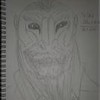HOME | DD
 artbyjrc — Planet of the early apes - Basal hominoids
artbyjrc — Planet of the early apes - Basal hominoids

#ape #extinct #hominid #hominoid #miocene #primate #proconsul #oreopithecus #dendropithecus #ekembo #rukwapithecus #simiolus
Published: 2020-11-19 09:36:12 +0000 UTC; Views: 21261; Favourites: 310; Downloads: 69
Redirect to original
Description
A selection of basal hominoid apes, to scale.
Today apes have a global reach, but if you remove one upright, mostly hairless species then the picture is less rosy. There is only a handful of non-human ape species and these are restricted to equatorial Africa and South-east Asia. Meanwhile their closest relatives are the cercopithecoid monkeys which are more diverse and widely distributed throughout Africa, Asia and Europe (only just). Go back in the Early Miocene and the reverse was the case with up to eight times the number of ape genera compared to present.
Living hominoid apes share a wide range of features, such as large brains, stiff back, mobile joints, long forearms, grasping ability and an absence of a tail. Apes also show a wide repetoire of locomotory styles with slow deliberate climbing in orang-utans, acrobatic suspensory brachiation by gibbons and bipedal walking in humans. However the early hominoids from the Late Oligocene and Early Miocene, bear little resemblance to their later relatives. Species with good skeletal remains such as Proconsul reveal that they were primarily quadrapedal travellers on top of branches. Larger individuals of Proconsul, which were within the size range of chimpanzees, have been renamed as Ekembo. It would have resembled a large cercopithecoid monkey rather than an ape in overall anatomy, but had a coccyx instead of a tail. It was only after the early apes migrated towards Eurasia did they develop adaptations to thrive in new environments. These later species are closer to modern hominoids, for example had thicker enamel on their teeth for processing hard foods.
Several species diverged from the basic quadrupedal ape type. Dendropithecus was previously considered to be a close relative of gibbons, being a small slender ape capable of brachiating. However the two are not closely related as Dendropithecus shows a number of primitive features.
Far more puzzling was the last surviving ape in Europe (that is prior to the later migration of humans). Isolated during the Late Miocene on the Tuscano-Sardinia island, Oreopithecus was an island endemic with a host of odd features. The short pelvis is so similar to that seen in humans, that this small ape was believed to be a hominine and that it must have spent time walking bipedally. However Oreopithecus was unlikely to be a runner due to the shape of it's feet. Acting more like a steadying tripod when upright, the big toe (hallux) formed a unique 100 degree angle with the other toes. However the structure of the spine was not consistent with bipedal walking, and the limbs were in similar proportions to other climbing apes. Confusingly a carbon isotope analysis of the teeth indicate that Oreopithecus was eating grasses and sedges, plants that don't grow in forests. Possibly it was wading upright through wetlands to get to an unconventional food source. It died out when the landbridge was reformed to continental Italy.
Related content
Comments: 41

👍: 0 ⏩: 1

👍: 1 ⏩: 0

👍: 2 ⏩: 1

👍: 1 ⏩: 1

👍: 2 ⏩: 1

👍: 1 ⏩: 0

👍: 2 ⏩: 1

👍: 2 ⏩: 1

👍: 1 ⏩: 1

👍: 1 ⏩: 1

👍: 1 ⏩: 0

👍: 1 ⏩: 0

You are specially gifted to draw primates. Very natural and lifelike. Very good work!!
👍: 2 ⏩: 1

👍: 1 ⏩: 0

Well, what do you know, it’s my family portrait! I’m the big guy at the bottom there. Mom on the left, and dad on the far right.
👍: 1 ⏩: 1

👍: 1 ⏩: 1

👍: 2 ⏩: 0

👍: 1 ⏩: 0

👍: 1 ⏩: 1

👍: 1 ⏩: 1

👍: 2 ⏩: 1

👍: 2 ⏩: 0

👍: 2 ⏩: 0

👍: 2 ⏩: 1

👍: 1 ⏩: 1

👍: 1 ⏩: 1

👍: 0 ⏩: 0

👍: 0 ⏩: 1

👍: 1 ⏩: 0

👍: 2 ⏩: 0

👍: 1 ⏩: 1

👍: 2 ⏩: 2

👍: 1 ⏩: 1

👍: 0 ⏩: 0

👍: 0 ⏩: 0

👍: 3 ⏩: 0

👍: 1 ⏩: 0



















